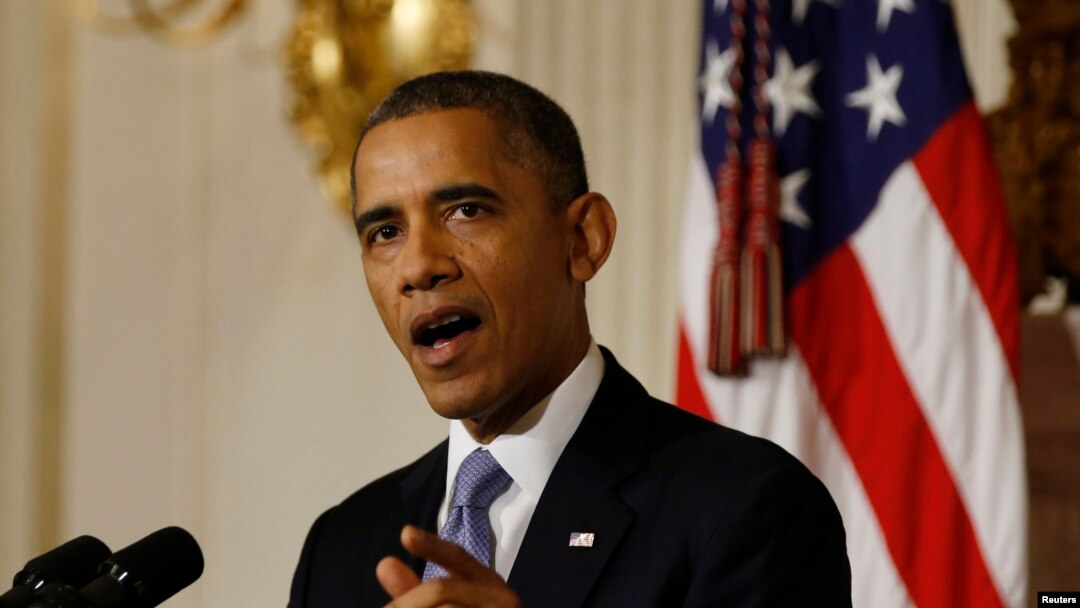U.S. lawmakers are moving on from the crisis of the government shutdown to talks aimed at resolving deep budget differences between Democrats and Republicans.
A congressional panel has convened to address issues such as the size of the government and the level of federal taxation. The talks were mandated by the last-minute compromise bill that ended the federal shutdown this week.
The panel, which began its work on Thursday, is scheduled to produce some kind of compromise budget plan by December 13.
No winners

Speaking at the White House, Obama said the impasse that sparked a 16-day partial government shutdown "inflicted completely unnecessary damage" on the U.S. economy.
He said the American people are "completely fed up with Washington," and that it is time to earn back their trust.
"Let us be clear, there are no winners here. The last few weeks have inflicted completely unnecessary damage on our economy. We don't know yet the full scope of the damage, but every analyst out there believed it slowed our growth. We know that families have gone without paychecks or services they depend on. We know that potential home buyers have gotten fewer mortgages and small business loans have been put on hold. We know that consumers have cut back on spending and that half of all CEOs say that the shutdown and the threat of shutdown set back their plans to hire over the next six months," said Obama.
Back to work
Thousands of U.S. federal employees returned to work after Congress approved a compromise bill late Wednesday to fund the government, which Obama immediately signed into law.
The bill keeps the government running until at least January 15 and raises the borrowing limit to put off the risk of default until February 7.
If the debt ceiling was not raised, the United States would lose the authority to borrow money to keep paying its bills.
Credit rating
Standard & Poor's estimated the shutdown has taken $24 billion out of the economy while the Fitch credit rating agency warned it is reviewing its AAA rating on U.S. government debt for a possible downgrade.
The government shut down on October 1 when the Senate rejected House demands to defund or delay President Obama's health care law as part of a spending bill. The president said he would not negotiate changes in the law until the government reopened.
House Speaker John Boehner said House Republicans fought with everything they had to force negotiations on the law, nicknamed "Obamacare." Boehner said his party will continue to push for legislative oversight and highlight perceived flaws in the plan.
A congressional panel has convened to address issues such as the size of the government and the level of federal taxation. The talks were mandated by the last-minute compromise bill that ended the federal shutdown this week.
The panel, which began its work on Thursday, is scheduled to produce some kind of compromise budget plan by December 13.
No winners

U.S. President Barack Obama delivers remarks on the end of the U.S. government shutdown in the State Dining Room of the White House, Oct. 17, 2013.
Also on Thursday, U.S. President Barack Obama stated that he felt there were "no winners" in the bill approved by Congress to fund the government and avoid a potential debt default.Speaking at the White House, Obama said the impasse that sparked a 16-day partial government shutdown "inflicted completely unnecessary damage" on the U.S. economy.
He said the American people are "completely fed up with Washington," and that it is time to earn back their trust.
Details of the US Debt Deal
Details of the Deal- Reopens and funds the government until January 15, 2014
- Raises the debt limit until February 7, 2014
- Requires the government confirm the eligibility of people receiving federal subsidies under the Affordable Care Act
- Sets up negotiating committee to develop long term budget plan
- Provides back pay to furloughed federal workers
Back to work
Thousands of U.S. federal employees returned to work after Congress approved a compromise bill late Wednesday to fund the government, which Obama immediately signed into law.
The bill keeps the government running until at least January 15 and raises the borrowing limit to put off the risk of default until February 7.
FILE - Senate Majority Leader, Democrat Harry Reid of Nevada, and Senate Minority Leader and Republican Mitch McConnell of Kentucky, right,.
Senate Majority Leader Harry Reid, a Democrat, and his Republican colleague, Senate Minority Leader Mitch McConnell, crafted the bill a day before the government's borrowing authority expired.If the debt ceiling was not raised, the United States would lose the authority to borrow money to keep paying its bills.
Credit rating
Standard & Poor's estimated the shutdown has taken $24 billion out of the economy while the Fitch credit rating agency warned it is reviewing its AAA rating on U.S. government debt for a possible downgrade.
The government shut down on October 1 when the Senate rejected House demands to defund or delay President Obama's health care law as part of a spending bill. The president said he would not negotiate changes in the law until the government reopened.
House Speaker John Boehner said House Republicans fought with everything they had to force negotiations on the law, nicknamed "Obamacare." Boehner said his party will continue to push for legislative oversight and highlight perceived flaws in the plan.

